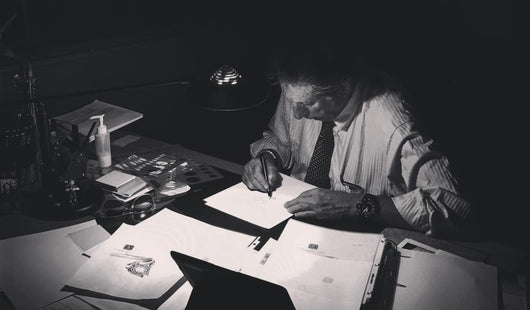
Glossary: Opal
Known for their luminous, iridescent qualities, opals are beautiful semi-precious stones that have been used in a variety of jewelry pieces for hundreds of years.
A species of quartz, the mineral is composed of noncrystalline (amorphous) silica and a small amount of water. Known for its distinctive display of flickering rainbow colors (called play-of-color), opals are available in two broad classes: common and precious. Precious opals commonly display play-of-color, while common opals do not.
With that said, there are really three types of opals: common opal, red or fire opal (a milky stone that’s red to fiery orange in color with little to no opalescence), and opalescent precious opal (black or white, with a rainbow-like iridescence resulting from tiny cristobalite crystals). There are also transparent contra luz opals that reveal a play of brilliant iridescence whenever light shines through the mineral stone.
How Do Opals Form?
Opal is essentially the product of seasonal rains that once soaked the dry ground in such regions as Australia’s "outback." The showers coated the earth and soaked deep into ancient rock beneath the soil, carrying dissolved silica (a combination of oxygen and silicon) with it. During the driest periods, a lot of the water evaporated, leaving behind solidified deposits of silica between the layers of subterranean sedimentary rock. These silica deposits formed opal over time.
When Australia’s mines started commercially producing opals in the 1890s, the country rapidly became the world's top source for the stone. That said, opals are found in many places throughout the world, including Czechoslovakia, Kenya, Brazil, Honduras, Peru, Mexico, the USA and Canada.
Why Are Opals So Colorful?
The famous play-of-color occurs in precious opals because they are composed of sub-microscopic spheroids stacked in a sort of grid-like pattern (similar to layers of plastic Ping-Pong balls tightly packed within a box. As light travels between each sphere, the waves bend or diffract. As these light waves break up, they give off spectral colors which are essentially varying colors of the rainbow.
While they are beautiful, opals aren’t especially durable; with a hardness of 5.5 to 6.5 on the Mohs scale, these stones are susceptible to scratching and cracking.
What Does Opal Symbolize?
October’s birthstone, opal has long been valued as a stone of magic and luck, mostly due to its flashing rainbow of colors. Because the mineral has all the colors of other gems, the ancient Romans regarded it as the most powerful and precious stone. The Bedouins also valued opals, believing that they contained lightning and fell to earth during thunderstorms.
Is Opal Expensive?
The price of opal can vary widely depending on the quality of the mineral. Because they have a superior quality, Australian opals are very expensive, especially in comparison to opals sourced from other parts of the world.
Red or “fire” opals are generally more valuable than green opals which, in turn, are more valuable than opals showing only blue color. The most prized variety of opal, black opal can cost more than $10,000 a carat.
Boulder opals can have a darker body tone but aren’t as valuable, while white opals are generally the least valuable form of the stone. When valuing an opal, it is also important to identify the stone type. An opal triplet or doublet can be worth a lot less than a solid opal. Triplets and doublets are essentially ‘“assembled” stones that contain a very small slice of natural opal and are therefore usually a lot less valuable.
Is Black Opal Rare?
Black opals are exceptionally rare and are only known to form in Australia. The most prized type of the stone, black opal can cost more than $10,000 a carat.
Is Opal Worth More than Diamond?
In many instances, diamonds will be more expensive than opals; however, this isn’t always the case; since high-quality opals are rarer than diamonds, they tend to hold greater value.
Caring for Opals
Since many opals have a relatively high water content, they can dry out and eventually crack if they aren’t properly cared for. Opals should be stored in damp cotton wool and cleaned with warm, soapy water. Some types of opal are treated with wax, oil or resin to enhance the appearance of their finish. Still, it’s best to only use plain soap and water to clean these stones.
Prized for their exceptional and unique beauty, opals are popular in a wide variety of jewelry pieces, such as this square opal pendant necklace. At John Atencio, we provide a compelling collection of opal stones that artfully complement our beautifully crafted jewelry pieces. Visit one of our locations and let our jewelry experts guide you to the perfect jewelry piece.

